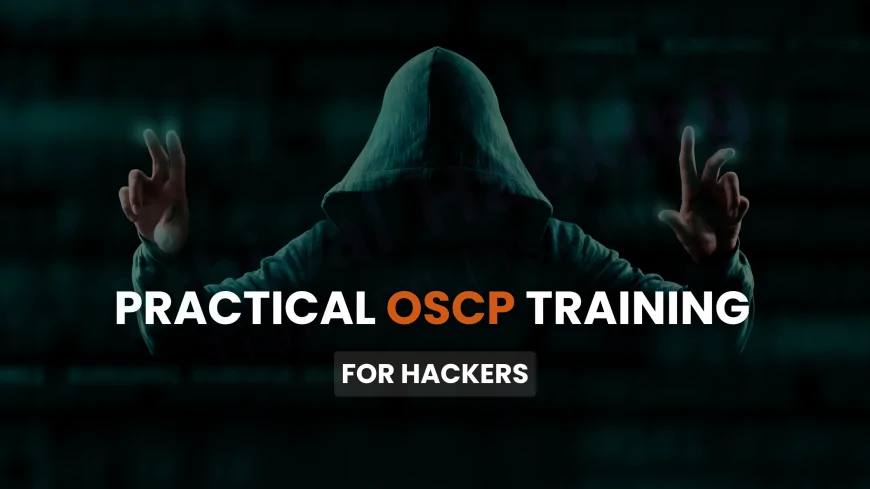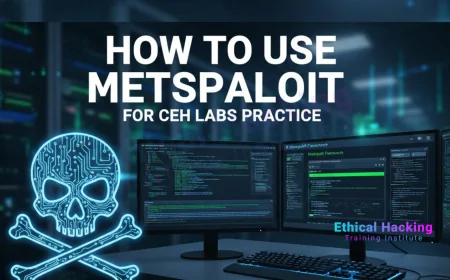Hands-On OSCP Certification Training| Master Penetration Testing with Practical Labs in Pune
Looking to advance your cybersecurity career? Learn how hands-on OSCP certification training can help you master penetration testing through practical labs. This comprehensive guide explores the key elements of OSCP training, its benefits, and how you can enhance your skills to successfully pass the OSCP exam. Unlock career opportunities in cybersecurity and become a certified ethical hacker with practical experience.

Table of Contents
- What is OSCP Certification
- The Importance of Hands-On Training for OSCP
- Tools and Techniques Covered in OSCP Training
- Benefits of Hands-On OSCP Labs
- How to Make the Most of OSCP Hands-On Training
- OSCP Certification A Career-Boosting Credential
- Practical Tools and Techniques in OSCP Training
- Conclusion
- Frequently Asked Questions (FAQs)
The OSCP (Offensive Security Certified Professional) certification is one of the most respected credentials in the cybersecurity industry. Known for its focus on practical, real-world penetration testing, the OSCP exam is a challenging test that proves a candidate's ability to identify and exploit vulnerabilities. As cyber threats continue to evolve, there is a growing demand for skilled ethical hackers. This blog will explore the importance of hands-on OSCP certification training and how practical labs play a crucial role in preparing candidates for the exam and real-world cybersecurity challenges.
What is OSCP Certification?
The OSCP certification is a technical, hands-on certification provided by Offensive Security. This certification is designed to validate your ability to conduct penetration testing in real-world scenarios. It demonstrates your skills in identifying and exploiting vulnerabilities in different operating systems and networks. The OSCP exam is unique because it challenges candidates to prove their skills by compromising multiple machines in a 24-hour period, which then requires submission of a detailed report outlining the steps taken.
The Importance of Hands-On Training for OSCP
Hands-on training is the backbone of OSCP certification. Unlike traditional theoretical learning, practical experience is key to mastering penetration testing. The OSCP program includes a set of hands-on labs that simulate real-world penetration testing environments. These labs help you develop the necessary skills and knowledge to work with various tools and techniques, as well as tackle the different challenges you will face during the OSCP exam and on actual security assessments.
Practical Labs in OSCP Training
The labs included in OSCP training replicate the environment of a real-world network, allowing students to apply their skills in a safe, controlled space. These labs allow learners to experience practical penetration testing scenarios, such as:
-
Exploitation: Learning how to exploit known and unknown vulnerabilities.
-
Privilege Escalation: Gaining higher-level access once an initial foothold is obtained.
-
Post-Exploitation: Maintaining access to compromised systems and executing further attacks.
-
Reconnaissance and Scanning: Using tools like Nmap and Netcat to discover open ports, services, and potential weaknesses.
The practical nature of these labs ensures that you don’t just learn how to conduct penetration testing but that you gain confidence in using tools and methods in a real-world setting.
Tools and Techniques Covered in OSCP Training
One of the most valuable aspects of OSCP training is the hands-on experience with a wide range of penetration testing tools and techniques. Some of the key tools you will use during the training and exam include:
-
Nmap: A network scanning tool for identifying open ports and services.
-
Netcat: A networking tool used for establishing connections and reverse shells.
-
Metasploit: A powerful tool used for exploiting vulnerabilities and conducting penetration tests.
-
Hydra: A tool for brute-forcing passwords across various protocols.
-
Burp Suite: A tool for web application security testing.
-
John the Ripper: A tool used for cracking password hashes.
Learning to use these tools effectively is essential, as they are commonly used by penetration testers and ethical hackers in the industry.
Benefits of Hands-On OSCP Labs
-
Realistic Experience: Practical labs simulate real-world environments where you will encounter a wide variety of systems and security challenges. This hands-on experience is crucial in developing the skills needed to perform penetration tests in actual job roles.
-
Skill Mastery: The hands-on approach to OSCP certification ensures that you gain proficiency with the core concepts of penetration testing. The more you practice in these labs, the more comfortable you will become with solving complex security problems.
-
Confidence in Testing: Completing real-world labs boosts your confidence in handling different testing scenarios. Whether you are performing exploitation, privilege escalation, or post-exploitation, you will feel more confident in applying these skills in professional environments.
-
Comprehensive Understanding: Hands-on training helps you understand the entire penetration testing process—from scanning and reconnaissance to exploiting vulnerabilities and submitting detailed reports. This comprehensive knowledge is vital for a successful career in cybersecurity.
How to Make the Most of OSCP Hands-On Training
To maximize the benefits of OSCP practical labs, here are some tips:
-
Practice Regularly: Consistent practice is key. Make time every day to complete lab exercises, explore new systems, and apply different tools and techniques.
-
Simulate Real Attacks: Treat each lab as if it were a real-world engagement. Apply the same methodology you would use during a real penetration test to enhance your learning.
-
Work Collaboratively: Although OSCP is an individual certification, discussing challenges with peers or joining study groups can enhance learning. Sometimes, collaboration can help in solving more complex issues.
-
Focus on Post-Exploitation: Post-exploitation is one of the most critical parts of penetration testing. Spend time learning how to pivot to other systems and maintain access after compromising a target.
-
Master Your Tools: Don’t just use penetration testing tools—understand their functions and how they work. This deeper knowledge will make you a more efficient and effective penetration tester.
OSCP Certification: A Career-Boosting Credential
An OSCP certification is more than just a test—it’s a gateway to exciting career opportunities in cybersecurity. The certification demonstrates your ability to handle complex penetration testing tasks and proves to employers that you have practical, hands-on experience. It is highly regarded by companies looking for skilled professionals in roles such as:
-
Penetration Tester
-
Red Team Specialist
-
Security Analyst
-
Vulnerability Assessor
-
Cybersecurity Consultant
-
Ethical Hacker
In addition to the practical skills gained, OSCP certified professionals are seen as capable and reliable, making them a valuable asset to any organization focused on improving their security posture.
Practical Tools and Techniques in OSCP Training
| Tools/Techniques | Description |
|---|---|
| Nmap | A network scanner used for identifying open ports, services, and vulnerabilities. |
| Netcat | A networking tool used for reverse shells and establishing connections. |
| Metasploit | A framework for developing and executing exploit code against remote targets. |
| Hydra | A password-cracking tool for testing login credentials across multiple services. |
| Burp Suite | A web vulnerability scanner for testing web applications. |
| John the Ripper | A password cracker for testing password security. |
Conclusion
The OSCP certification is one of the best ways to prove your penetration testing expertise. The inclusion of hands-on labs allows you to build real-world skills that will serve you well throughout your career. By practicing regularly and gaining exposure to various penetration testing techniques, you can pass the OSCP exam with confidence and begin a rewarding career in ethical hacking and cybersecurity. If you're serious about becoming a professional in the cybersecurity field, OSCP certification will not only enhance your technical skills but also provide you with the credentials needed to advance in the industry.
FAQs
What is OSCP certification?
OSCP (Offensive Security Certified Professional) is a highly respected certification that validates a cybersecurity professional's ability to perform penetration testing in real-world environments.
How do practical labs help in OSCP training?
Practical labs provide real-world scenarios that help learners develop and master the skills needed for penetration testing, including vulnerability scanning, exploitation, privilege escalation, and post-exploitation.
What tools are used in OSCP training?
Key tools like Nmap, Netcat, Metasploit, Burp Suite, and Hydra are integral to OSCP training, helping students practice real-world penetration testing scenarios.
What is the format of the OSCP exam?
The OSCP exam consists of a 24-hour practical test where candidates must compromise multiple machines and submit a report detailing the steps taken to exploit vulnerabilities.
What are the benefits of hands-on OSCP training?
Hands-on OSCP training equips students with real-world experience in penetration testing, allowing them to confidently tackle complex cybersecurity challenges during the exam and in professional roles.
Is OSCP training suitable for beginners?
While OSCP training is not for absolute beginners, individuals with a solid foundation in networking and basic security concepts can benefit from this intensive, hands-on training.
How can I prepare for the OSCP exam?
Effective preparation for the OSCP exam includes practicing in hands-on labs, studying penetration testing methodologies, and familiarizing yourself with the tools and techniques used in real-world assessments.
What career roles can I pursue after completing the OSCP?
After completing OSCP certification, you can pursue roles such as penetration tester, ethical hacker, red team specialist, security consultant, and vulnerability assessor.
How long does it take to complete OSCP training?
The OSCP training duration varies based on your prior experience. On average, it can take between 3 to 6 months of consistent practice and learning to be fully prepared for the exam.
What is the difficulty level of the OSCP exam?
The OSCP exam is challenging and requires a deep understanding of penetration testing tools and techniques. The exam tests your ability to apply practical skills in a controlled, real-world environment.
Can I take OSCP training online?
Yes, OSCP training is available online, allowing students to learn at their own pace while gaining access to practical labs and exam resources.
How does OSCP certification improve my career prospects?
OSCP certification is recognized globally as a mark of advanced penetration testing skills. It significantly boosts career prospects in cybersecurity and opens doors to high-paying job roles.
What is the pass rate for the OSCP exam?
The pass rate for the OSCP exam is relatively low due to its practical nature. However, with thorough preparation and hands-on practice, candidates can significantly improve their chances of success.
What are the prerequisites for OSCP certification?
To succeed in OSCP certification, it is recommended to have basic knowledge of networking, Linux, and scripting languages, along with experience in ethical hacking or penetration testing.
Do I need any prior certifications for OSCP?
No formal prerequisites are required, but Offensive Security recommends basic knowledge of penetration testing and networking. Previous certifications like CompTIA Security+ or CEH can be helpful.
How do I register for the OSCP exam?
Registration for the OSCP exam is done through the Offensive Security website, where you can choose your training and exam dates.
Can OSCP training help me become an ethical hacker?
Yes, OSCP training is specifically designed to develop the skills needed to become an effective and capable ethical hacker through hands-on experience in penetration testing.
Are OSCP labs available for self-practice?
Yes, the OSCP labs are available as part of the training program and offer various scenarios that help candidates gain practical experience before the exam.
What is the cost of OSCP training?
The cost of OSCP training varies depending on the package you choose. The training includes access to labs, resources, and the exam fee.
Can I repeat the OSCP exam if I fail?
Yes, you can retake the OSCP exam if you fail. However, a retake fee is usually required, and you will need to continue practicing and enhancing your skills.
How does the OSCP differ from other cybersecurity certifications?
Unlike many cybersecurity certifications, OSCP focuses on real-world practical skills and requires candidates to prove their ability through hands-on penetration testing during the exam.
Are there any OSCP study groups available?
Yes, many online communities and study groups exist where candidates share resources, tips, and advice on preparing for the OSCP exam.
Is OSCP training available in Pune?
Yes, OSCP training is available in Pune through authorized centers offering hands-on labs and guided training for individuals pursuing the certification.
What is the job demand for OSCP-certified professionals?
There is high demand for OSCP-certified professionals in roles such as ethical hacking, penetration testing, and security consulting due to the increasing need for robust cybersecurity.
What's Your Reaction?
 Like
0
Like
0
 Dislike
0
Dislike
0
 Love
0
Love
0
 Funny
0
Funny
0
 Angry
0
Angry
0
 Sad
0
Sad
0
 Wow
0
Wow
0


















